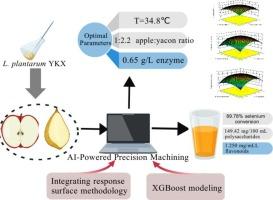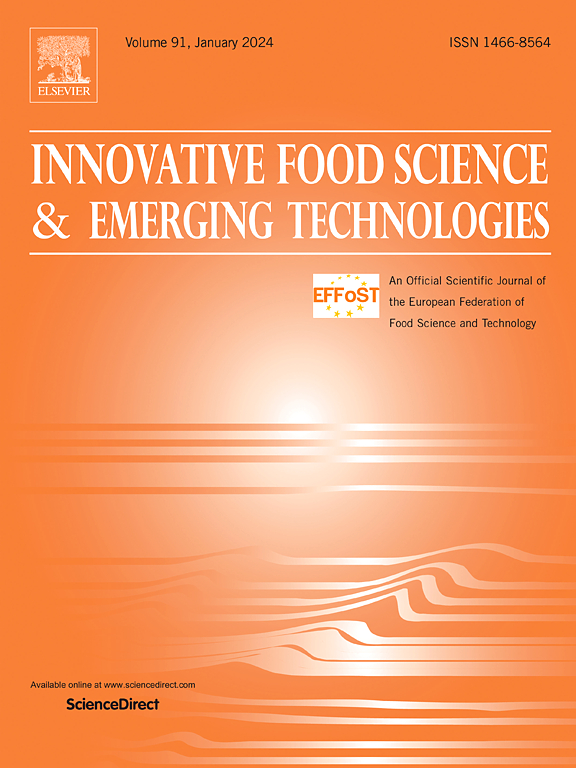Machine learning-driven multimodal optimization of selenium biotransformation and flavor profiling in fermented apple–Yacon functional beverages
IF 6.8
1区 农林科学
Q1 FOOD SCIENCE & TECHNOLOGY
Innovative Food Science & Emerging Technologies
Pub Date : 2025-08-22
DOI:10.1016/j.ifset.2025.104198
引用次数: 0
Abstract
This study developed an artificial intelligence (AI)-driven framework to optimize selenium-enriched Yacon-apple juice fermentation. By integrating response surface methodology (RSM) and extreme gradient boosting (XGBoost) modeling, key parameters (34.8 °C, 1:2.2 apple:yacon ratio, 0.65 g/L enzyme) were identified, resulting in 89.78 % selenium conversion and high bioactive yields (149.42 mg/100 mL polysaccharides; 1.250 mg/mL flavonoids). XGBoost demonstrated superior predictive accuracy (R2 = 0.953) over traditional RSM, revealing temperature thresholds (34–35 °C) critical for Lactiplantibacillus plantarum YKX (L. plantarum YKX) activity. Headspace-gas chromatography–ion mobility spectrometry (HS–GC–IMS) analysis revealed fermentation-driven flavor evolution: 442 % ester accumulation (ethyl acetate) at 4 days correlated with sensory improvement (r = 0.91), whereas the content of aldehydes decreased by 23 %. Multimodal machine learning linked polysaccharide metabolism to flavor enhancement (R2 = 0.927) and identified a critical 12–24 h selenium conversion window (1.52 %/h rate). This work bridges empirical optimization with explainable AI, providing actionable guidelines (temperature control ±0.5 °C, enzyme synergy) for scaling functional foods. Limitations in dataset size highlight the need for sensor-augmented monitoring. This approach advances precision fermentation technologies to balance nutrient bioavailability, flavor complexity, and bioactive retention in selenium-enriched beverages.

发酵苹果-雪莲果功能饮料中硒生物转化及风味特征的机器学习驱动多模态优化
本研究开发了一个人工智能驱动的框架来优化富硒雪莲果-苹果汁的发酵。结合响应面法(RSM)和极端梯度增强(XGBoost)模型,确定了关键参数(34.8°C, 1:2 2苹果:雪莲比,0.65 g/L酶),得到了89.78%的硒转化率和较高的生物活性产量(149.42 mg/100 mL多糖,1.250 mg/mL黄酮类化合物)。与传统的RSM相比,XGBoost的预测精度更高(R2 = 0.953),揭示了植物乳杆菌YKX (L. plantarum YKX)活性的临界温度阈值(34-35℃)。顶空-气相色谱-离子迁移谱(HS-GC-IMS)分析揭示了发酵驱动的风味演变:4天内积累442%的酯(乙酸乙酯)与感官改善相关(r = 0.91),而醛含量下降23%。多模态机器学习将多糖代谢与风味增强联系起来(R2 = 0.927),并确定了关键的12-24 h硒转化窗口(1.52% /h)。这项工作将经验优化与可解释的人工智能联系起来,为功能性食品的缩放提供了可操作的指导方针(温度控制±0.5°C,酶协同)。数据集大小的限制突出了传感器增强监测的必要性。该方法推进了精密发酵技术,以平衡营养生物利用度、风味复杂性和富硒饮料的生物活性保留。
本文章由计算机程序翻译,如有差异,请以英文原文为准。
求助全文
约1分钟内获得全文
求助全文
来源期刊
CiteScore
12.00
自引率
6.10%
发文量
259
审稿时长
25 days
期刊介绍:
Innovative Food Science and Emerging Technologies (IFSET) aims to provide the highest quality original contributions and few, mainly upon invitation, reviews on and highly innovative developments in food science and emerging food process technologies. The significance of the results either for the science community or for industrial R&D groups must be specified. Papers submitted must be of highest scientific quality and only those advancing current scientific knowledge and understanding or with technical relevance will be considered.

 求助内容:
求助内容: 应助结果提醒方式:
应助结果提醒方式:


